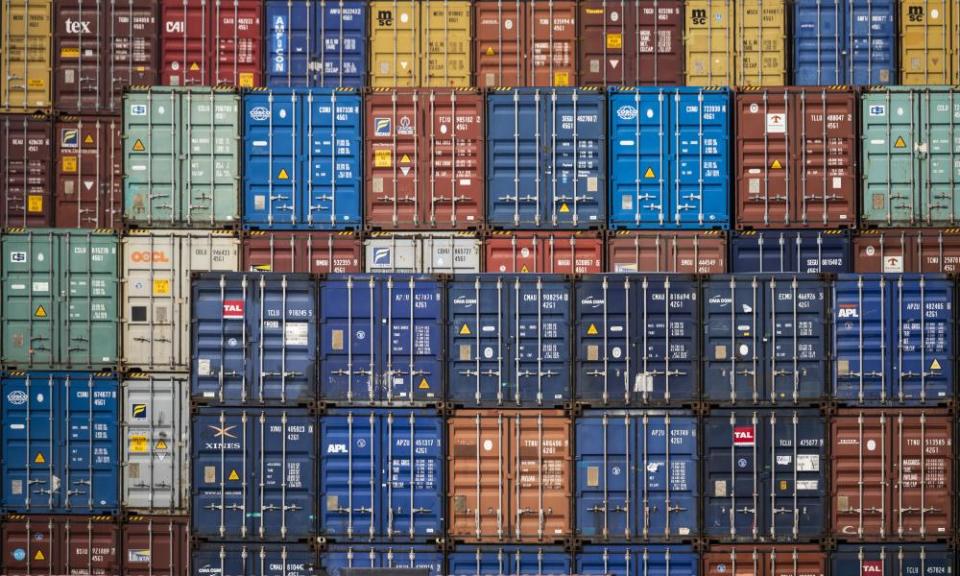Brexit: UK growth tipped to slow as firms run down stockpiles

Economic growth in Britain is expected to slow to the lowest levels since the financial crisis as firms run down Brexit stockpiles, according to a leading business lobby group.
After a stockpiling rush this year that pumped up the rate of economic growth, the British Chambers of Commerce said growth would slow in 2020 and 2021.
The organisation has slashed its forecast for GDP growth next year to just 1%, from 1.3%, marking the weakest expansion in the British economy since the 2009 recession that followed the financial crisis.
Growth is also forecast to remain subdued in 2021, at 1.2%, down from its previous estimate of 1.4%.
The British economy has benefited in recent months as companies braced for a no-deal Brexit ahead of the original deadline of 29 March, before Theresa May delayed the process until the autumn.
Gross domestic product (GDP) is a key government statistic and provides a measure of the UK's total economic activity.
Put simply, if GDP is up on the previous three months, the economy is growing; if it is down, it is contracting. Two or more consecutive quarters of contraction mean the economy is officially in recession.
GDP is the sum of all goods and services produced in the economy, including the service sector, manufacturing, construction, energy, agriculture and government.
Economists are concerned with the real rate of change of GDP, which shows how the economy is performing once inflation is taken into account.
The Office for National Statistics produces quarterly official GDP figures about three and a half weeks after the end of each three-month period.
The ONS uses three measures and they should, at least in theory, all add up to the same number.
• The value of all goods and services produced - known as the output or production measure.
• The value of the income generated from company profits and wages - known as the income measure.
• The value of goods and services purchased by households, government, business (in terms of investment in machinery and buildings) and from overseas - known as the expenditure measure.
The ONS publishes three estimates of quarterly GDP figures. The first "flash" estimate comes out about 25 days after the quarter in question has ended. The figures usually get revised in subsequent months as more data from businesses and government departments is received. But even the third, dubbed "final", estimate of quarterly GDP is not set in stone: the Blue Book, which is published once a year, in August, contains revisions going back the last 18 years.
The National Institute of Economic and Social Research's estimate comes out about three weeks before the official figures.
The ONS also calculates the size of the UK economy relative to the number of people living here. GDP-per-capita shows whether we are actually getting richer or poorer, by stripping out the impact of population changes.
The unprecedented rise in manufacturers storing up raw materials and components fuelled a rise in GDP of 0.5% in the first three months of the year, which the BCC said should lift the overall growth rate in for 2019 as a whole.
However, the increase means firms now have inventories they can run down without needing to place as many orders for new stock, hitting economic momentum. Economic growth went into reverse in April as companies halted their rush to stockpile, while car manufacturers also halted production after planning to avoid disruption around the original Brexit deadline.
Suren Thiru, head of economics at the BCC, said: “It is increasingly likely that the temporary boost from historically high stockpiling in the first quarter, which has marginally improved the growth outlook for this year, will be surpassed over the medium-term by the negative impact from the running down of these inventories.”
He said a no-deal Brexit could damage economic growth in Britain further, should a new prime minister after the Conservative leadership race walk the country away from a deal with Brussels.
“A messy and disorderly exit from the EU remains the main downside risk to the UK’s economic outlook as the disruption caused would increase the likelihood of the UK’s weak growth trajectory translating into a more pronounced deterioration in economic conditions,” he said.
The continuing lack of clarity over Brexit means that business investment is forecast to contract at a faster rate this year than was previously thought, while the lingering uncertainty means corporate spending will also recover more slowly next year.
Business investment fell for four quarters in a row last year, marking the worst run in Britain since the financial crisis, and damaging the longer-term growth rate of the UK economy. Companies investing in new technology have the potential to produce gains in productivity.
The BCC said business investment was expected to continue falling in 2019 due to the political chaos over Brexit.
Adam Marshall, director general of the lobby group, said: “Businesses are putting resources into contingency plans, such as stockpiling, rather than investing in ventures that would positively contribute to long-term economic growth. This is simply not sustainable.”

 Yahoo News
Yahoo News 